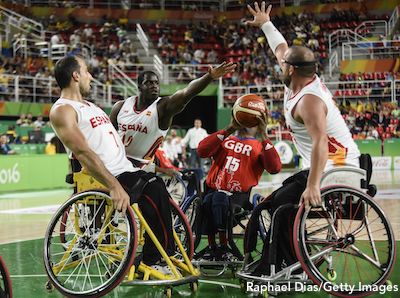As I was watching television Wednesday afternoon, I realized that the programming was making me as happy as anything I have watched in more than a decade. I was watching the comprehensive coverage of the Paralympics on NBC Sports Network.
This is the first time the Paralympics have received this kind of coverage, and I urge anyone who likes sports or patriotism to check it out. There is still several hours of coverage on the NBC Sports Network as we head into the weekend and a three-hour block of programming Sunday afternoon on NBC.
Before the games even started I was so excited to see the Paralympics get more advance press coverage than ever before in the United States, but I was recognizing a trend that was making me uneasy. The word inspiration was coming up in almost every story.

The word inspiration is loaded in the adaptive athletic community. Some athletes dislike it with a passion and some are neutral on the topic, while others appreciate being called inspirational.
I have been firmly in the adaptive athletic community for 25 years, and I would say that I have been neutral on the word inspiration for most of that time. But I have been inching toward the dislike side of the argument as the years have been ticking by.
I think the word is used as a crutch for the media as a way to say: "Wow! These athletes do incredible things, but they are so different than us."
There is part of me that is struggling with the idea of complaining about anything. There is no way my 10-year-old self, who saw one small newspaper clipping for Barcelona, or my 18-year-old self, who saw an incredibly grainy live stream of two wheelchair basketball games in Sydney could ever imagine that my present-day self has been enjoying dozens of hours of coverage on my TV from Rio.
Why am I complaining about one little word?
I am not complaining for myself. NBC has already exceeded my wildest dreams as a child and a young adult. I am making a fuss in a hope of more inclusion for future generations of adaptive athletes. I want my adaptive brothers and sisters to be full of confidence that I could never imagine as an adolescent. I want them to know they are not second-class citizens and whether they accomplish their athletic goals or not they can lead successful lives off the field of play.

Everyone in this world is different and just because someone does not fit into the perception of being able-bodied does not mean they belong in some side table of the banquet of life. We deserve equal access to the buffet.
To help this dream come true we need as many able-bodied allies as we can get. A simple way to start is to check out the rest of NBC's coverage. The coverage is completely riveting to me. It is completely engrossing and compelling to me, and I hope others agree.
My hope is that any new viewers of this weekend's coverage come up with their own adjectives to describe the athletes' performances. I am hopeful that people might check out an extraordinary performance this weekend and the next time people come across a disabled person it will be more ordinary and less inspirational.





